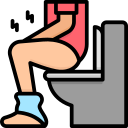Overview
Bacterial Enteric Gastroenteritis (BEG), also called bacterial gastroenteritis, is an infection of the stomach and intestines caused by harmful bacteria. It is often referred to as food poisoning. People get this infection after eating contaminated food or drinking dirty water, which leads to symptoms like diarrhoea, stomach cramps and vomiting.
Unsure if it is just an upset stomach or BEG? Dr. Debjoy Sau can help you get the right diagnosis. Call for a consultation.

Symptoms of Bacterial Gastroenteritis

Loose, watery or sometimes bloody stool (diarrhoea)
Stomach pain or cramps
Nausea and vomiting
Fever and chills

Headache
Feeling weak or tired

Dehydration (dry mouth, dizziness, less urination)
If symptoms are severe or last more than a few days, visit Dr. Debjoy Sau for immediate treatment.
Causes of BEG
Children, older adults and people with weak immunity mostly get infected from BEG. It is caused by bacteria entering the digestive system through:
Contaminated or undercooked food (meat, dairy, seafood)
Drinking unclean water
Poor hand hygiene
Improper food storage
Common Bacteria that Cause BEG

E. coli

Salmonella

Streptococcus pneumoniae

Klebsiella pneumoniae

Shigella

Campylobacter

Clostridium difficile
BEG Treatment Options
Oral Rehydration:
Drinking plenty of water, fluids, ORS or electrolyte solutions to prevent dehydration.
Diet:
Eat light, soft foods as advised by your doctor once you feel better.
Rest:
Let your body recover on its own.
Antibiotics:
These are given in severe or persistent cases after identifying the bacteria.
Anti-diarrhoeal Medicines:
These are only recommended in severe bacterial infection cases, but they are not always advised.
Hospital Care:
Needed if dehydration is severe or symptoms worsen.
Looking for expert care for stomach infections in Kolkata? Dr. Debjoy Sau is just a call away. Book your appointment now.

Book An Appointment
FAQs
Know Your Answers
Is BEG the same as food poisoning?
Yes, BEG is commonly known as food poisoning caused by harmful bacteria.
Is BEG serious?
Most cases are mild. However, if left untreated, severe dehydration or complications may occur.
Can I treat BEG at home?
Mild cases often get better with rest and proper fluid intake. But if symptoms are severe, you must see a doctor.
When should I see a doctor?
If you have a high fever, bloody diarrhoea or signs of dehydration (like dry mouth or dizziness) lasting for more than 2 days, consult a doctor immediately.
How can I prevent BEG?
Wash your hands properly before eating, drink clean water, eat freshly cooked food and avoid street food during the monsoon season.

